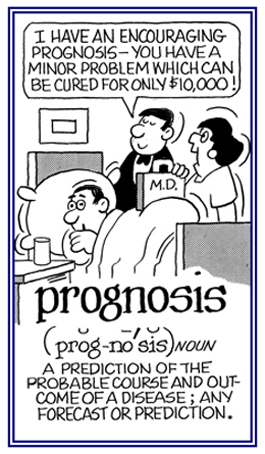gno-, gnos-, gnoto-, -gnostic, -gnosia, -gnomic, -gnomonic, -gnomical, -gnomy, -gnosia, -gnostic, -gnosis
(Greek: know, learn, discern)
2. Relating to the science of the signs and symptoms of diseases: When the doctor examined Judy, he noticed the typical pathognomic indications that pointed to a particular disease that was circulating among children in the area.
Such distinctive visual and pathognomonic clues can indicate a certain illness on which a diagnosis can be made.
2. The science of the signs by which human passions are indicated: Pathognomy includes the outward expression of a person's feelings.
Pathognomy is the study of passions and emotions. It refers to the expression of emotions that are indicated in the voice, gestures, and by features.
While physiognomy is used to predict the overall character of an individual, pathognomy is used to gain clues about the current character.
Physiognomy is based on shapes of the features, and pathognomy on the motions of the features.
2. A branch of pharmacology that deals with active substances found in plants
2. The use of facial features to judge someone's character or temperament.
3. The character or outward appearance of something, e.g. the physical features of a landscape.
2. The loss of the power to recognize sensory stimuli; the varieties correspond with the several senses and are distinguished as auditory, visual, olfactory, gustatory, and tactile.
2. A prediction about how a given situation will develop: For some people there is an optimistic prognosis about the economic recovery.
3. Etymology: from Greek prognosis from Latin prognosis from progignoskein, "to come to know beforehand" from pro-, "before" + gignoskein "to come to know."

Go to this Word A Day Revisited Index
so you can see more of Mickey Bach's cartoons.
2. A forecast or prediction.
3. An omen or portent; a sign.
4. A sign of a future happening; a portent.
2. An indication of the future result of something: Jane’s headache was hurting her and she couldn’t breathe so her doctor prognosticated that her influenza would last for quite sometime.
3. To forecast or to predict something from present indications or signs; to prophesy: The weather forecast is prognosticated to be clear and sunny for the next few days.
4. Something that presages: When people see birds appearing at the end of winter, they are believed to prognosticate that spring is coming.
5. To predict according to present conditions or signs; to foretell: There is urban renewal that currently prognosticates a social and cultural renovation for the city.
Instead of using the verb prognosticate all the time in his essay, Jim used synonyms like "to foreshadow" and "to portend”, which made his composition more interesting.

Go to this Word A Day Revisited Index
so you can see more of Mickey Bach's cartoons.
It may be congenital or result from injury or disease of the brain.
2. The inability to recognize familiar faces which is not explained by defective visual acuity or reduced consciousness or alertness.Prosopagnosiacs can see a person clearly and can describe the person; for example, hair and eye color, but cannot identify the individual by name.
People with prosopagnosia may identify someone by touch, smell, speech, or the manner in which the person walks. In some rare cases, an affected individual cannot recognize his or her own face.
2. The branch of clinical psychology that emphasizes the use of psychological tests and techniques for assessing mental illness.
Inter-related cross references, directly or indirectly, involving word units meaning "know, knowledge; learn, learning": cogni-; discip-; histor-; intellect-; learn, know; math-; sap-; sci-; sopho-.


